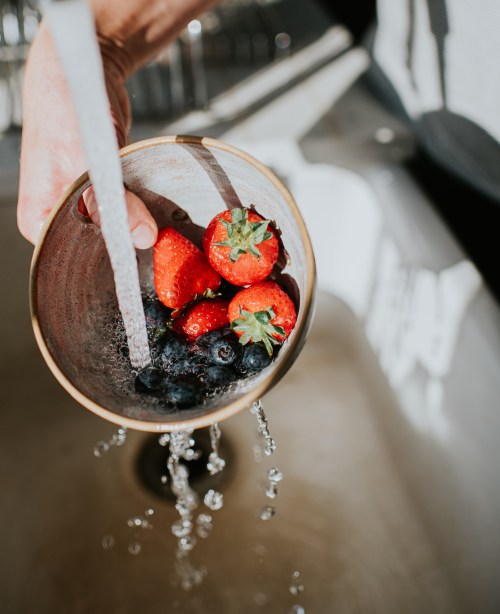There’s a New Multi-State Tomato Recall, and It May Get Bigger
Bad news from the FDA as we head into peak tomato season—here's what experts want you to know.

Update 6/2/25: The FDA has issued its highest classification, Class I, to three states affected by the salmonella outbreak—North Carolina, South Carolina, and Georgia. A class one risk level means there's a "high probability" the outbreak "will cause serious adverse health consequences or death," according to the FDA.
Previous 5/3/25: Two different companies have recalled tomatoes due to salmonella concerns, according to the Food and Drug Administration (FDA). Ray & Mascari Inc and Williams Farms Repack LLC distributed the now-recalled tomatoes across 14 states.
Experts in This Article
author of Food Safety: Past, Present, and Predictions and a professor at Northeastern University
The Williams Farms Repack LLC tomatoes were the first to be recalled on May 2. That was followed by the Ray & Mascari Inc. the next day. Multiple lots are impacted in the recall.
Many of these tomatoes are loose, meaning they likely ended up in produce sections of grocery stores without a clear label, but some are in clamshells. Here’s what you need to know.
What is the tomato recall?
The tomato recall involves two separate companies.
Williams Farms Repack LLC is recalling several tomato sizes:
- 4x5 2 layer
- 60 count 2 layer
- 3 count trays in the Williams Farms Repack label
- 5x6 25lb
- Combo 25lb
- 4x4 2 layer
- 6x6 25lb H&C Farms Label
- 60ct 18lb loose
- XL 18lb loose
These tomatoes may have the lot codes R4467 or R4470, per the FDA. The company was told in late April that tomatoes supplied by H&C Farms may be contaminated with salmonella, according to the recall notice. (The FDA has photos of the boxes and labels for the tomatoes.)
The tomatoes were distributed between April 23 to April 28 in these states, according to the FDA:
- Georgia
- North Carolina
- South Carolina
Ray & Mascari Inc. is recalling its 4 Count Vine Ripe Tomatoes that were packaged in 20-ounce clamshell containers.
Those have the UPC number 7 96553 20062 1, and a master case label with lot number RM250424 15250B or lot number RM250427 15250B. The company started the recall after being notified by Hanshaw & Capling Farms that there was a possible presence of salmonella in their facility, according to the FDA, which shared a photo of the label.
The recalled tomatoes were sold by Gordon Food Services Stores in these states, according to the FDA:
- Illinois
- Indiana
- Kentucky
- Michigan
- Missouri
- Mississippi
- New York
- Ohio
- Pennsylvania
- Tennessee
- Wisconsin
What makes this recall dangerous?
Both recalls are due to salmonella, which is the leading cause of foodborne illness in the U.S. Salmonella causes about 1.35 million infections in the country every year, along with 12,000 hospitalizations and 238 deaths, per Centers for Disease Control and Prevention (CDC).
Salmonella infection usually causes watery diarrhea that might have blood or mucus and stomach cramps, although people may also have headache, nausea, vomiting, and loss of appetite, according to the CDC. Symptoms usually start anywhere from six hours to six days after someone has been infected and can last up to a week.
Some people with salmonella infection can develop more severe illnesses like arthritis, blood infections, and brain infections, per the CDC.
“Most people recover, but it can be life threatening,” says Kara Lynch, RD, a food safety educator at Michigan State University Extension.
Because the recall involves two different brands, there’s a chance that more tomatoes may be impacted and pulled from shelves, according to Darin Detwiler, author of the book Food Safety: Past, Present, and Predictions and a professor at Northeastern University. “When more than one brand is involved, it often means there’s a shared source, such as a grower, processor, or distribution center,” he says. “These supply chains are highly interconnected, so if one point in the system is contaminated, the impact can quickly spread across multiple brands and states.”
Since tomatoes are usually eaten raw, Detwiler points out that there’s no cooking step to kill any harmful bacteria before you eat them.
No one has gotten sick in either recall so far, according to the FDA.
How does salmonella end up in tomatoes?
There are a few different ways that tomatoes can end up contaminated with salmonella. “Water is a common source of Salmonella contamination,” says Ellen Shumaker, PhD, director of outreach for the Safe Plates program at North Carolina State University. “If irrigation water has become contaminated—for example, from animal feces—it can then contaminate fresh produce like tomatoes.”
Tomatoes could become contaminated in the field if they come in contact with soil that contains salmonella, she says. “Cross contamination could also occur during handling or processing,” Shumaker says.
“Tomatoes have smooth but slightly porous skin,” Detwiler says. “If the skin is damaged,even just a small crack, the bacteria can enter the flesh and stay there all the way to your plate.”
What to do if you have the recalled tomatoes at home
If you have the impacted tomatoes at home, the FDA recommends that you avoid eating them and throw them out. If you have questions or have gotten sick, you should reach out to the company that distributed the tomatoes. For Williams Farms Repack LLC, contact Jason Breland at 843-866-7707 or 843-599-5154; For Ray & Mascari Inc., call 1-317-637-0234.
But, if you’ve eaten a recalled tomato and have severe symptoms of a salmonella infection, including dehydration, Detwiler recommends contacting your healthcare provider about next steps.










